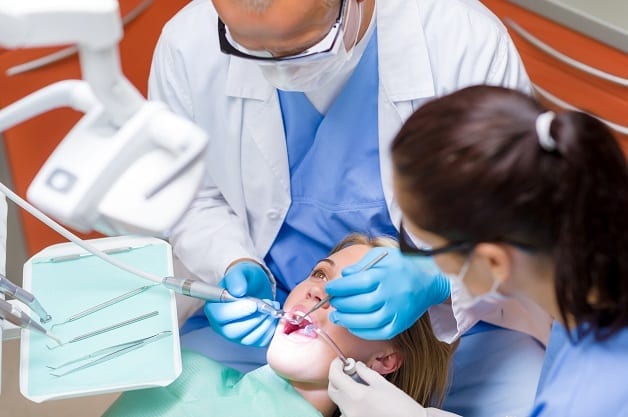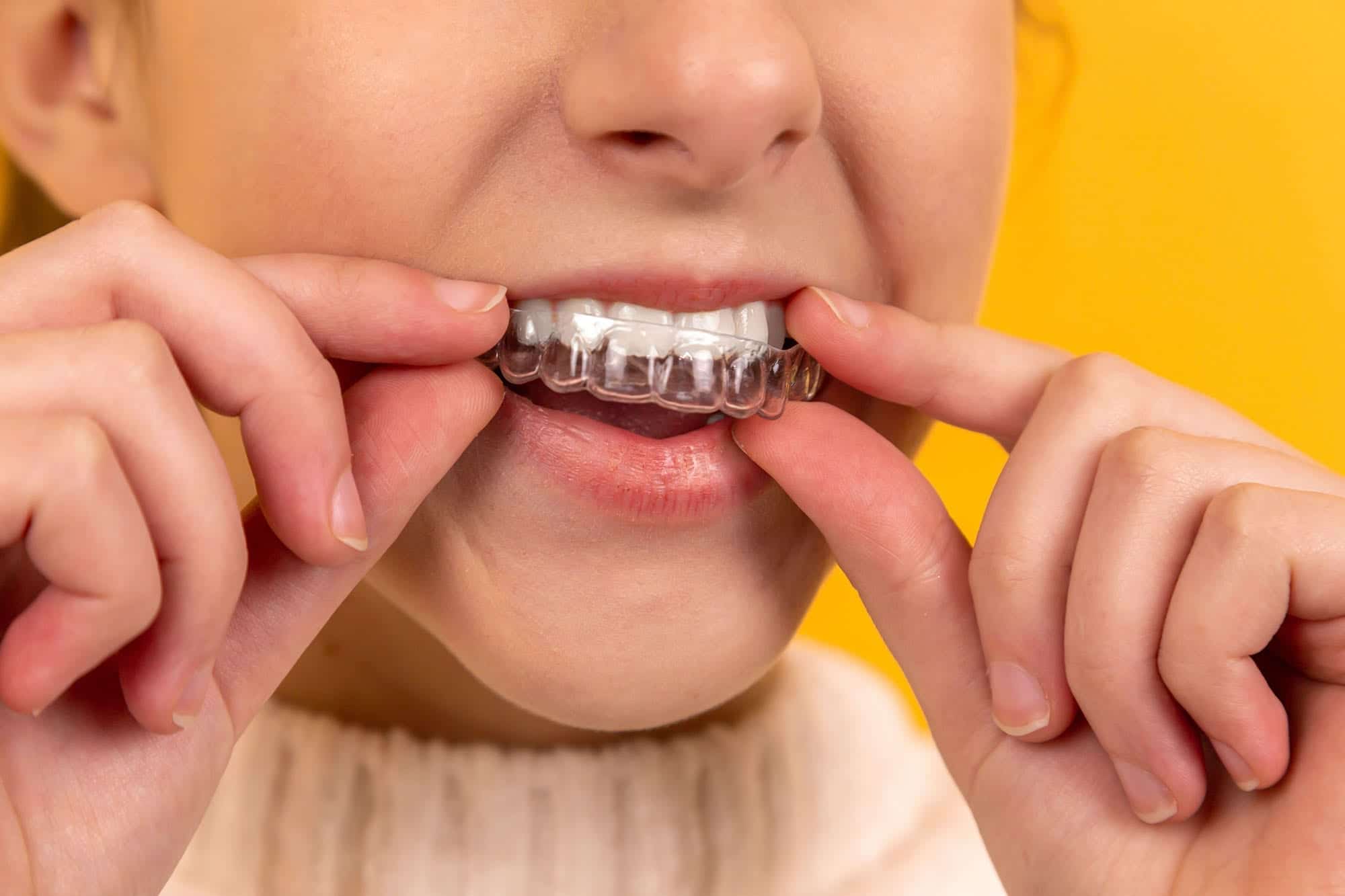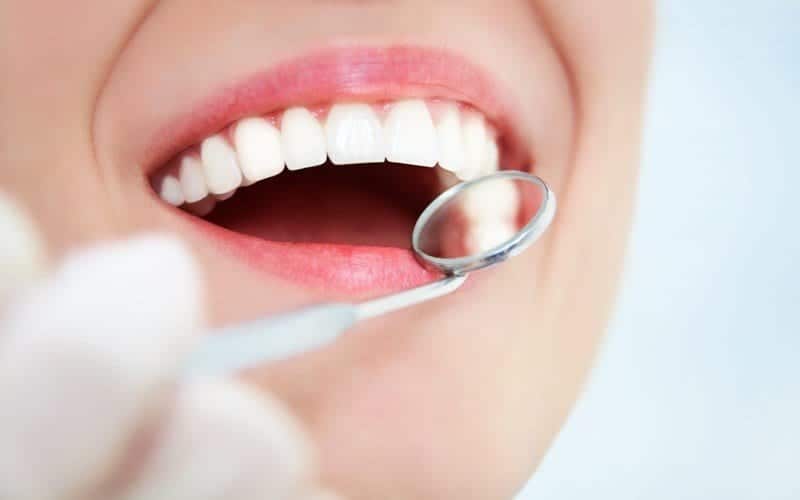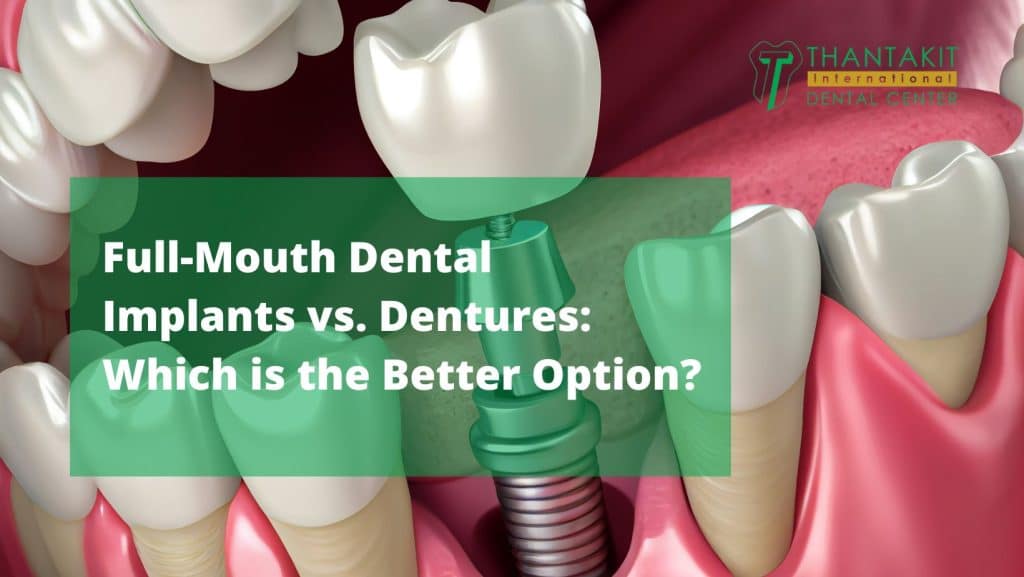Do you have missing teeth and you’re searching for a solution to get back your youthful smile and lost confidence? In such a case, you have at least two viable solutions—full-mouth dental implants or permanent dentures.
Both options have their respective pros and cons which we’ll discuss at length here. To pick one over the other, you as a patient should know the differences between the two.
This will allow you to make an informed decision about them. This article will provide you with a brief then detailed comparison between full-mouth dental implants (plus crowns and/or bridges) and full-arch dentures (and even implant-supported dentures).
You should also be aware of your budget, your needs, your oral health, the state of your teeth, and your dentist’s opinion to decide which solution is best for you!
Page Contents
What are Full-Mouth Dental Implants?
Full-mouth implants are usually applied in situations where the patient has mostly missing teeth or rotted teeth requiring extraction. They serve as a permanent solution to lack of teeth by surgical placement of titanium or ceramic implants to the jawbone.
Surgery is required because the gums must be cut by a skilled surgeon to access the jawbone. It serves as the artificial tooth root or anchor to the restorative bridge.
Furthermore, bone grafting might be called for in case the patient lacks enough bone density to support the metal implant or post. In essence, it involves major surgeries and healing time.
A successful implant surgery also involves osseointegration or the implant fusing with the jawbone. Note that not every patient can be a candidate for this.
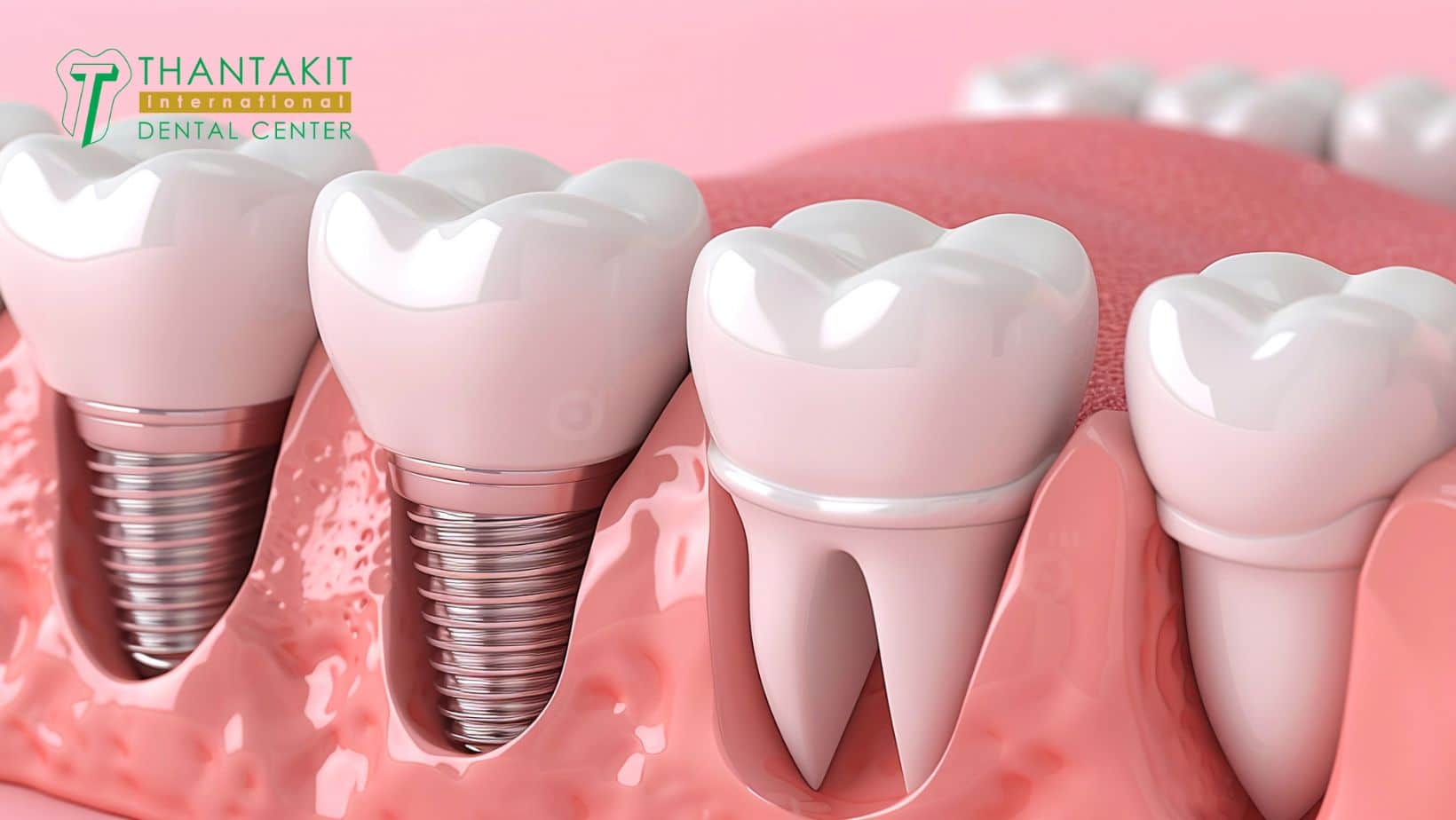
The Argument for Implants
Many patients choose this major investment that in many cases can cost as much as a used car because of its natural look and feel. Unlike standalone dentures, implants support bridges or even dentures too to make them feel and look more like natural teeth. You can particularly feel this benefit when chewing food or speaking. The complete set of anchored teeth really improves both actions.
This also gives the side effect of enhanced self-confidence with your new smile. What’s more, implants can last up to 20-30 years with proper oral care.
It can even preserve your jawbone density through its osseointegration that stimulates calcium and bone production to reinforce your jaw when push comes to shove!
The Argument Against Implants
It’s not the perfect solution though. It can cost as much as $7,000-$90,000 or more per arch, but it’s a lot cheaper at Thantakit Dental Center through dental tourism.
It’s also time-consuming due to the multiple surgeries and healing periods. You can only do it with sufficient jawbone density. Finally, it may involve bone grafting or sinus lifts.
What are Dentures?
Dentures are removable artificial teeth and gums popularized in pop culture as false teeth that most seniors have. They’re more commonplace than full-arch implants because they’re way more affordable.
These dentures are usually made of metal, ceramic, or acrylic. They also involve taking impressions or molds of the mouth to get custom-made dentures from a dental lab.
Take note, most of the elderly people who have them can’t take the surgery necessary to put in an implant (you should be in peak health and have enough jawbone density to be a candidate for implantation).
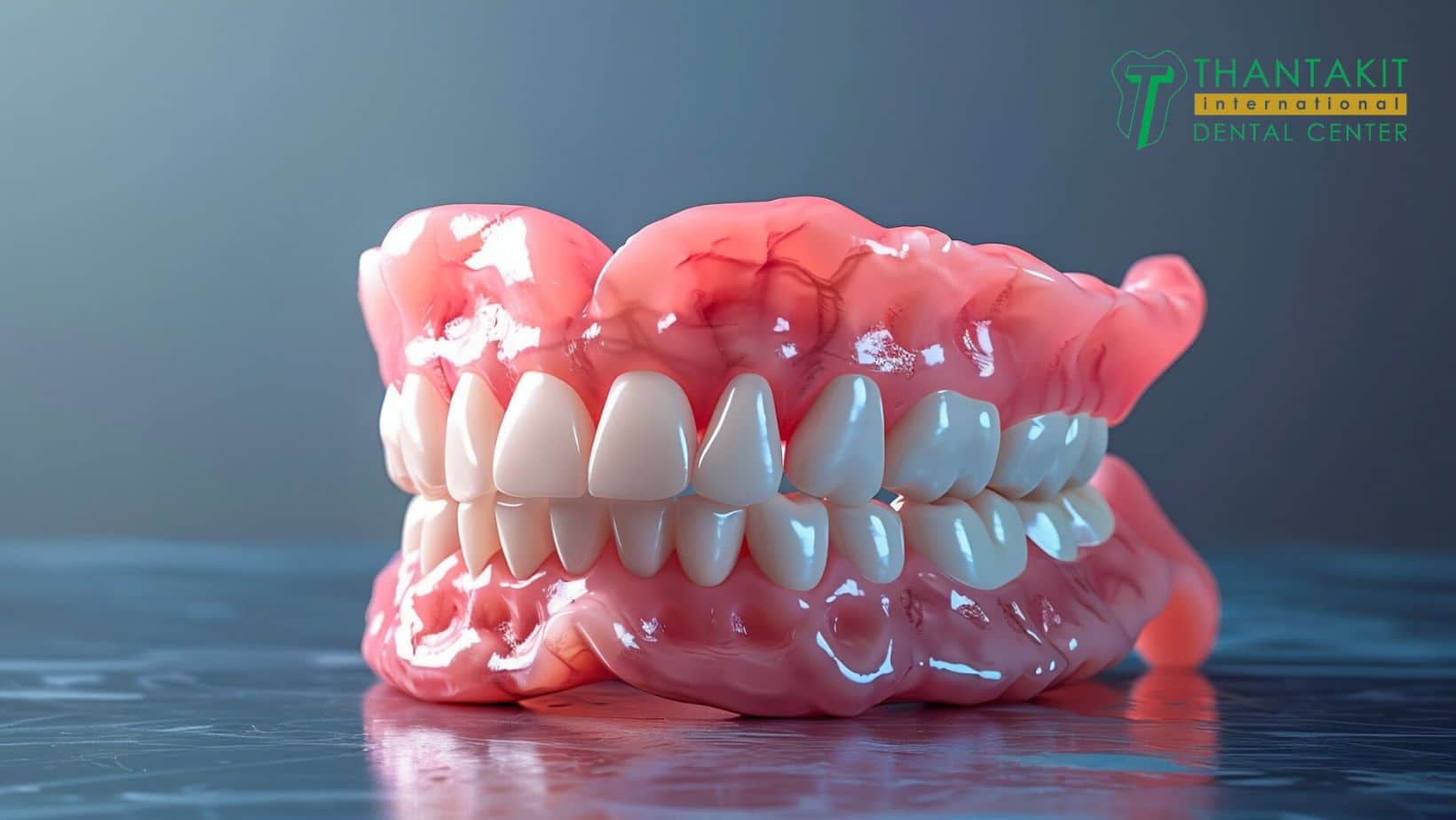
The Argument for Dentures
Dentures are less expensive. On average, they only cost $50 to $5,000 or more per arch. Even better, you can get a bigger bargain for them at Thantakit Dental Center without compromising on their quality.
Furthermore, there’s no surgery required to put up dentures. They’re also relatively easy to maintain and clean because they’re removable (just keep them in a glass of antiseptic overnight).
The procedure to do them is also much faster. Instead of waiting 3-6 months for implant surgery healing and osseointegration and an additional 3-6 months if you needed bone grafting first, it only takes 2-6 weeks to make custom dentures.
The Argument Against Dentures
Slippage and discomfort might happen because dentures might not fit perfectly. It should have some space for you to work with to allow for adjustments though. It also requires regular adjustment and replacements.
Like when wearing braces, wearing dentures can also alter your speaking abilities and affect chewing (good dentures with dental adhesive should aid chewing though).
Finally, jawbone resorption can occur over time because you’re using dentures instead of a surgical implant. Then again, it does help prevent teeth crowding regardless.
The Pros and Cons of Full-Mouth Dental Implants
Here are the benefits of dental implants for single-tooth or multi-tooth prosthodontics (crowns and bridges).
-
Durability: Implants are designed to last a lifetime with proper care and regular oral health maintenance. They’re connected to abutments and use crowns made of porcelain or porcelain fused with metal.
-
Natural Appearance and Function: They look and feel more like natural teeth, allowing for better chewing and speaking. They don’t move around or shift.
-
Bone Preservation: Implants stimulate the jawbone, preventing bone loss that can occur with dentures or living with missing teeth as an adult. This strengthens your jawbone for oral and bone health.
-
Stability: Implants are fixed in place, eliminating the need for dental adhesives and lowering the risk of slippage like in the case of dentures.
-
Improved Oral Health: Implants don’t require tooth removal or alteration (i.e., contouring of healthy teeth to support them), as dentures or bridges do.
Here are the drawbacks to going the implant route in replacing missing teeth.
-
Cost: Implants are significantly more expensive than dentures. Thus, they’re outside most people’s budget.
-
Invasive Procedure: Implants require surgery to embed the posts in the jawbone. Not all patients are viable candidates for this procedure. Some might have conditions like high blood pressure that disqualify them from treatment.
-
Longer Treatment Time: The process of placing and integrating implants takes longer than making and fitting dentures.
-
Surgical Risks: There are potential risks associated with any surgery, which includes infection and nerve damage. Most avoid the surgical option as much as possible, seeking other more affordable and less risky options.
-
Maintenance: While implants are durable, they still require good oral care to maintain their health. It’s the same deal with dentures though.
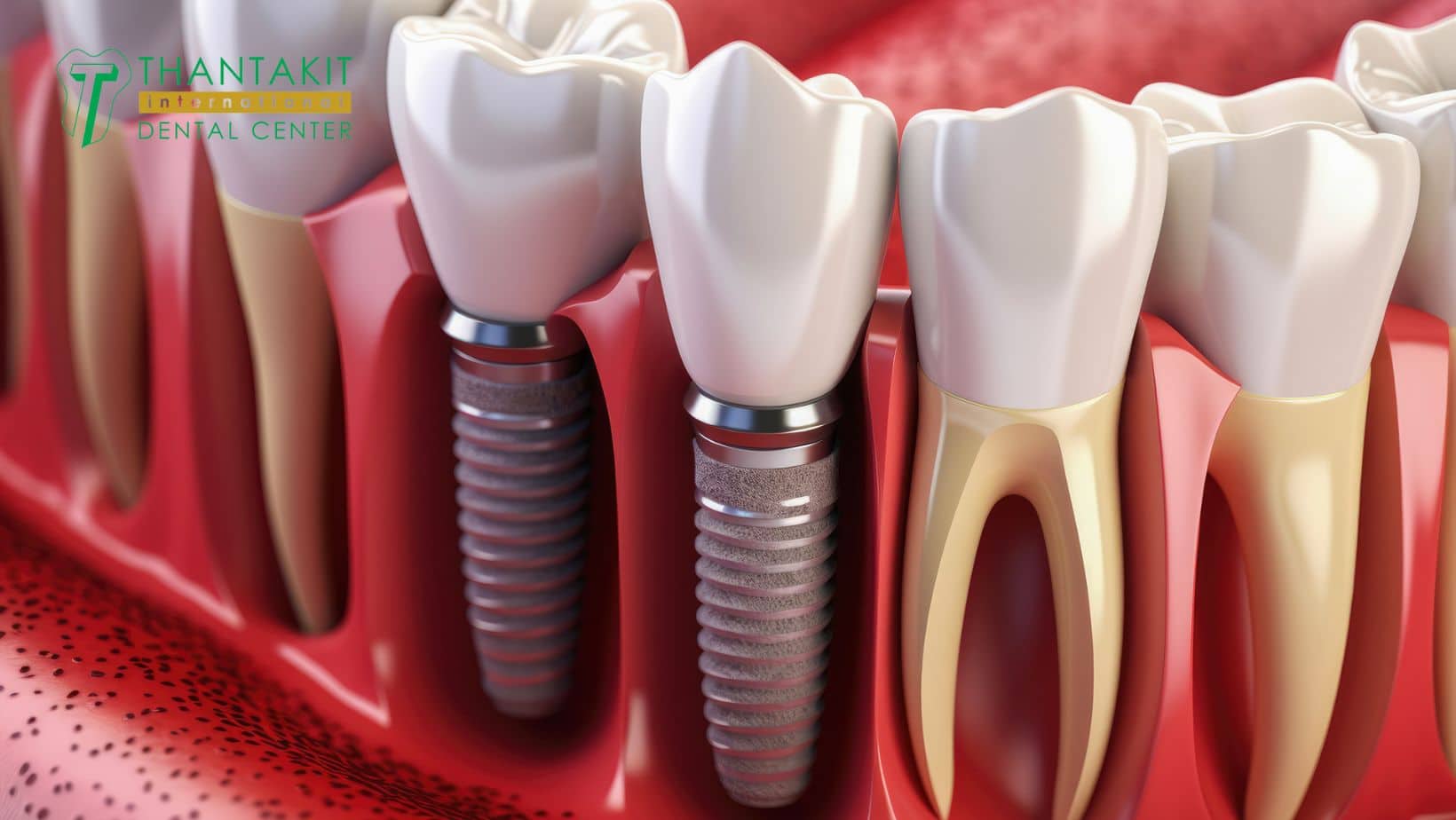
The Pros and Cons of Dentures
Let’s now discuss the benefits of dentures.
-
Affordability: Dentures are the more cost-effective option compared to implants. However, you can also use implants to support denture fitment in your mouth.
-
Replaceable: Dentures aren’t only cheaper to make. They’re also cheaper to replace in case you break your current set.
-
Avoid Crowding: Although it cannot prevent bone loss like implants could, a set of dentures can prevent teeth shifting and crowding by occupying the space where your missing teeth used to be.
-
Fewer Risks and Complications: Denture failure won’t cause serious complications compared to surgery issues and implant failure with osseointegration (fusion of the bone with the implant).
-
Convenience: Dentures are removable, allowing for easier cleaning and maintenance.
-
Less Invasive: The process of making and fitting dentures is less invasive than implant surgery plus making custom bridges and/or crowns. You also won’t have to wait for healing times and whatnot.
As for flaws, here they are.
-
Durability: Dentures aren’t made of titanium like implants or PFM like crowns or bridges to make them more affordable. Furthermore, they might need replacement or adjustment as your mouth topography changes.
-
Bone Loss: The jaw might suffer bone loss over time with dentures being a contributing factor (it leaves your missing teeth as still missing).
-
Function and Appearance: False teeth might not look or feel as natural as implant-assisted full-mouth bridge prosthodontics, leading to discomfort or slippage.
-
Maintenance: Dentures need regular cleaning on your part and may require dental adhesives to stay in place and prevent the infamous slippage risk.
-
Social Concerns: There are people who may feel self-conscious about wearing dentures, especially in social situations. It makes them feel old or think that people are aware that they’re wearing false teeth.
A More In-Depth Look into Implants vs. Dentures
In broad-strokes terms, you can depend on dental implants for a full-mouth tooth replacement. They generally offer a more durable, natural-looking, and comfortable solution than dentures.
However, they are also leagues more expensive and require surgery that you might not be a candidate for.
In contrast, dentures are the more affordable and less invasive option, but they can feel less natural, require adhesives, and may not be as durable as implant-supported crowns or bridges when all is said and done.
Full-mouth dental implants and dentures are two viable tooth replacement options for you. Which is ultimately best for your needs? It depends on the circumstances and your preferences, of course.
With that said, did you know you can use both solutions, implants, and dentures, at the same time?
A More In-Depth Look into Removable and Permanent Dentures
Dentures can come in two flavors—temporary and permanent. You have the more affordable and replaceable temporary dentures used by many seniors for their affordability and safety.
However, there’s a third option that can be thrown in the mix: Permanent dentures. So, what exactly are permanent dentures?
Also known as fixed dentures, these are dentures supported by implants. They’re dental prosthesis or prosthodontics that replace your missing teeth like with dentures, but there’s additional anchorage involved with implants.
This is in contrast to traditional removable dentures—literally your grandpa’s dentures—that are removable and rely on suction or adhesive to stay in your mouth.
With permanent dentures, you no longer have to worry about slippage and discomfort common with removable dentures when the adhesive runs out because the implants help anchor the dentures into place.
A More In-Depth Look into Dental Implant Options
We’ve already discussed at length the pitfalls and possibilities of implants compared to the perils and the promise of traditional dentures.
One is cheaper than the other, but the other is more functional and durable than one. Dental implants even figure in when it comes to replacing missing teeth with dentures, as though you can use both solutions at the same time!
With both full-mouth bridges and crowns or permanent dentures, the dental implant serves as an artificial tooth root fused right into the jawbone via osseointegration.
With that said, even with permanent dentures, the extra expense of getting porcelain or PFM crowns or bridges might be worth it over dentures because they’re even more durable.
On one hand, implants are so good at providing support and stability for the artificial teeth that even dentures depend on them to be permanent.
On the other hand, if you’re going to get implants anyway, why do so halfway and use dentures over them when you can go for a full-mouth dental implant smile restoration?
A Deeper Analysis into Dentures vs. Dental Implants
In a nutshell, traditional removable dentures are the cheapest option you can replace easily when damaged. This is followed by the slightly more expensive permanent dentures that are just as replaceable, but they’re supported by implant dentistry.
Lastly, full-mouth implants are the most expensive method of replacing missing teeth, especially if you opt for PFM, porcelain, or gold bridge solutions for them.
Full-mouth dental implants (All-on-4 to All-on-6 to get the full arch for the upper or lower jawbone) come with crowns (single-tooth and single-implant) bridges (a whole row of crowns).
You’re paying a premium for full-mouth dentures (or a slight bargain if you avail of them through us at Thantakit) because they’re worth every penny.
They last longer, properly jawbone-fused implants are harder to dislodge than even natural permanent teeth, and they feel great for chewing and speaking.
However, you can have roughly the same feel and aesthetics of bridges by going the ceramic, metal, or acrylic denture route that might lack the longevity of bridges but are more adjustable and replaceable than them.
The cheapest option is the most popular option among senior citizens for a reason though. What removable dentures lack in permanence and durability they make up for in safeness.
You’re less likely to need healing time, bone grafting, surgery complication risks, and a host of additional surgeries when just getting a “normal” denture.
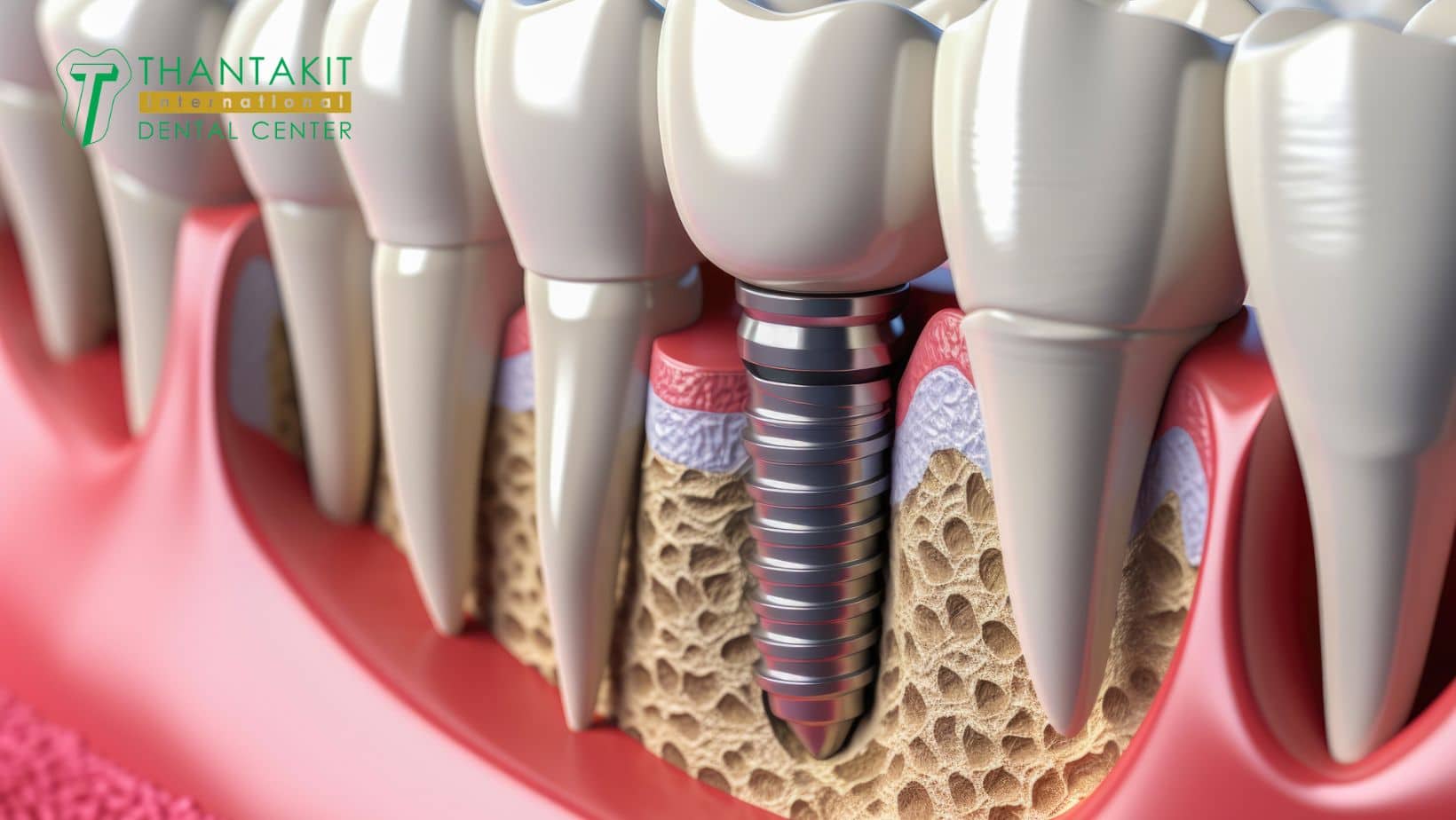
The Key Considerations of Either Choice
Cost is the major factor influencing the decision between dentures and implants. Most go for dentures because it’s cheaper, while others save up for implants like they would save up for a car or a motorbike because of its expensiveness.
Implants are a worthwhile investment because their longevity and benefits outweigh the upfront cost. Besides which, dental tourism can bring the initial cost down significantly.
Again, not all patients can avail themselves of implant dentistry. If they lack jawbone dentistry, they can get disqualified as candidates or opt for bone grafting. Dentures don’t need such requirements.
Dentures aren’t as comfortable as implants while implants offer a more natural feeling when you’re chewing or speaking.
In terms of maintenance, implants require more flossing and brushing. In contrast, dentures can easily be cleaned with an antiseptic solution in a glass then stored safely for future use.
Enjoy Affordable Bangkok Dentures or Implants Today
The best option for you, whether it’s dentures or implants— depends on your individual needs, preferences, and budget.
The state of your mouth and your oral health will determine if you’re a candidate for implants or whether replaceable dentures are your best bet. Regardless, you should consult with your dentist first to get the best recommendation possible for you.
If you are a full-mouth dental implant candidate who’s worried about the cost of such an operation, consider availing of a dental tour at beautiful Bangkok through Thantakit.
Contact Thantakit Dental Center today to get a virtual quote or consultations on their super-affordable implant surgery or denture solutions. They’re at the forefront of Bangkok dentistry for a reason!
Thantakit International Dental Center is Thailand’s longest established dental center. Situated in Bangkok, our clinic is renowned across the world as a destination for world-class dentistry, with most of our patients flying to us from Australia.
Feel free to reach out to us and get FREE dental consultation!



